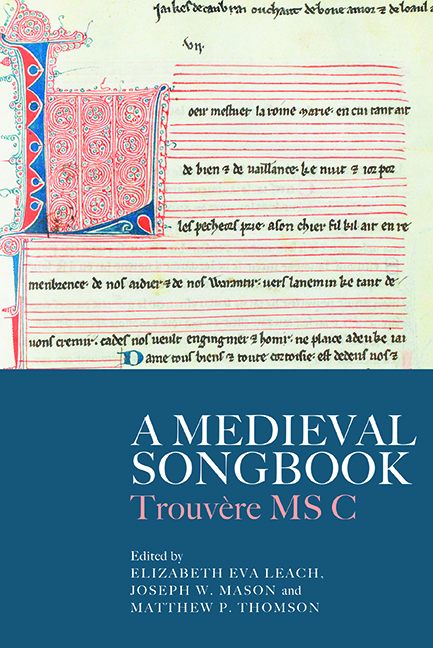Book contents
- Frontmatter
- Contents
- List of Illustrations
- List of Music Examples
- List of Tables
- List of Contributors
- Acknowledgements
- Abbreviations
- Editorial Practices
- Introduction
- Chapter 1 The Trouvère Manuscripts of the Burgerbibliothek Bern
- Chapter 2 The Lorraine Repertoire of C
- Chapter 3 Chansonnier C: Contents, Stemmatic Position, Particularities
- Chapter 4 A Note on the Decoration of C and its Artistic Context
- Chapter 5 Author Ascriptions and Genre Labels in C
- Chapter 6 Common Exemplars of U and C
- Chapter 7 Shared Small Sources for Two Early Fourteenth-Century Metz Chansonniers?
- Chapter 8 The Legacy of Thibaut de Champagne in C
- Chapter 9 Strategies of Appropriation in Jacques de Cambrai's Devotional Contrafacts
- Chapter 10 Jeux-Partis and their Contrafacts in C
- Chapter 11 C and Polyphonic Motets: Exemplars, Adaptations, and Scribal Priorities
- Appendix: List of Songs in C
- Bibliography
- Index of Sources
- Index of Songs
- General Index
- Studies in Medieval and Renaissance Music
Chapter 1 - The Trouvère Manuscripts of the Burgerbibliothek Bern
Published online by Cambridge University Press: 26 May 2022
- Frontmatter
- Contents
- List of Illustrations
- List of Music Examples
- List of Tables
- List of Contributors
- Acknowledgements
- Abbreviations
- Editorial Practices
- Introduction
- Chapter 1 The Trouvère Manuscripts of the Burgerbibliothek Bern
- Chapter 2 The Lorraine Repertoire of C
- Chapter 3 Chansonnier C: Contents, Stemmatic Position, Particularities
- Chapter 4 A Note on the Decoration of C and its Artistic Context
- Chapter 5 Author Ascriptions and Genre Labels in C
- Chapter 6 Common Exemplars of U and C
- Chapter 7 Shared Small Sources for Two Early Fourteenth-Century Metz Chansonniers?
- Chapter 8 The Legacy of Thibaut de Champagne in C
- Chapter 9 Strategies of Appropriation in Jacques de Cambrai's Devotional Contrafacts
- Chapter 10 Jeux-Partis and their Contrafacts in C
- Chapter 11 C and Polyphonic Motets: Exemplars, Adaptations, and Scribal Priorities
- Appendix: List of Songs in C
- Bibliography
- Index of Sources
- Index of Songs
- General Index
- Studies in Medieval and Renaissance Music
Summary
The Burgerbibliothek in Bern is home to the internationally acclaimed book collection of the French scholar and diplomat Jacques Bongars (1554–1612). The collection, considered by Bongars's contemporaries to be one of Europe’s most important private libraries, now forms the Bongarsiana department at the Burgerbibliothek. Bongars did not have any children and bequeathed the library to Jakob Graviseth (1598–1658), son of the Strasbourg banker and jeweller, Reinhard Graviseth (1560–1633). In 1624, Jakob Graviseth married Salome von Erlach (1604–36), the daughter of the mayor (Schultheiss) of Bern. Graviseth's books thus made their way to the city of Bern via Basel in 1632, where their acquisition doubled the holdings of the old Bernese library.
The collection's exceptional significance is apparent, first and foremost, in the age and quality of its manuscripts, which reflect the main areas of Bongars's interests: Roman antiquity, history, and grammar. Many of the manuscripts from these subject areas date to the Carolingian period, and several number among the oldest and most important extant textual witnesses of a given work or author. Bongars also maintained a keen interest in the history of France and of the crusades, a passion that explains the large number of prominent manuscripts on this subject, both in Latin and in French. Of slightly lesser prominence is the group of manuscripts that contain French poetry and music, even though these, too, include some exceptional items, such as the famous fabliaux codex (Cod. 354) and the manuscript known as C(Cod. 389), which constitutes the focus of the present volume.
Since e-codices, Switzerland's online database of manuscripts, not only hosts a full set of digital images for C, but also proffers a detailed description of its codicological features and contents, the present contribution restricts its codicological observations to the most essential information, and focuses, instead, on the manuscript’s later history of ownership and reception. The chapter's second part introduces two further, less familiar fragments of trouvère manuscripts, which form part of the Bongarsiana collection and are likewise available on e-codices: B (Cod. 231) and c (Cod. A 95.1).
- Type
- Chapter
- Information
- A Medieval SongbookTrouvère MS C, pp. 13 - 19Publisher: Boydell & BrewerPrint publication year: 2022

